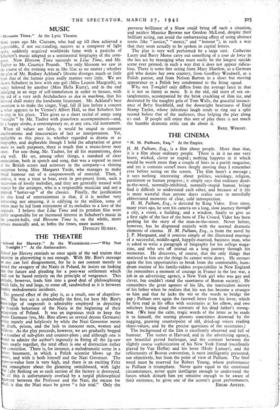THE THEATRE
"School for Slavery." At the Westminster.—" Why Not Tonight ? " At the Ambassadors.
School for Slavery reminds us once again pf the sad truism that Sincerity in playwriting is not enough. With Mr. Biro's message no one can feel disagreement, for he is not content merely to record the savagery of the Nazis ih Poland, he insists on looking to the future and pleading for a post-war settlement which shall not be based entirely on the principle of vengeance. This ttitude, however, leads him into a good deal of philosophising hich fails, by and large, to come off, sandwiched as it is between rankly melodramatic incidents.
The general effect of the play is, as a result, one of shapeless- ess. The best act is undoubtedly the first, for here Mr. Biro's wiedge of stagecraft is admirably employed in depicting e brutish behaviour of the Nazis at the beginning of their upation of Poland. It was an ingenious trick to keep the ent Germans (yes, Mr. Biro allows us several decent Germans) tting mutely and helplessly by while the Nazi Governor metes
death, prison, and the lash to innocent men, women and *Idren. As the play proceeds, however, we are gradually bogged a number of sub-plots and counter-plots ; and although one is nd to admire the author's ingenuity in fitting all the jig-saw eces neatly together, the total effect is one of distraction rather n conviction. There is, for instance, a melodramatic scene in a ory basement, in which a Polish scientist blows up the tory, and with it both himself and the Nazi Governor. The sPense-value here is very high, and there is an exciting Fritz g atmosphere about the gleaming switchboard, with light r light flashing on as each section of the factory is destroyed. t all this is unfortunately overlaid by a turgid philosophical
ent between the Professor and the Nazi, the excuse for ch is that the Nazi must be given " a fair Lial." Only the perverse brilliance of a Shaw could bring off such a situation, and neither Maurice Browne nor Gordon McLeod, despite their brilliant acting, can avoid the embarrassing effect of using abstract terms (like " justice," " mercy," and " honour "), in such a way that they seem actually to be spoken in capital letters. •
The play is very well performed by a large cast. Catherine Lacey and Barry Morse carry out something of a tour de force in the last act by managing what must easily be the longest suicide scene ever penned, in such a way that it does not appear ridicu- lous. There is some fine acting from Mary Martlew, as a German girl who denies her own country, from Geoffrey Wardwell, as a Polish patriot, and- from Nelson Burton in a short but moving appearance as a Polish boy condemned to the firing squad.
Why not Tonight? only differs from the average farce in that it is not so funny as most. It is the old, old story of sex en- tanglements, accompanied by the brisk crackling of thin ice, and decorated by the naughty grin of Tom Walls, the graceful insouci- ance of Betty Stockfield, and the downright heartiness of Enid Stamp Taylor, whose infectious laugh tends to ring out a split second before that of the audience, thus helping the play along no end. If people still enjoy this sort of play there is not much the humble dramatic critic can do about it.
BASIL WRIGHT.


























 Previous page
Previous page